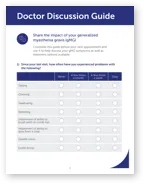CLINICAL TRIAL RESULTS
ZILBRYSQ was studied in a large clinical trial specifically for adults with anti-AChR antibody-positive gMG
174 participants of the 12-week trial were randomly divided into 2 groups to receive either ZILBRYSQ or a placebo:
- 0.3 mg/kg of ZILBRYSQ (86 participants)
- Placebo (88 participants)
They administered 1 dose each day for 12 weeks, in addition to their current gMG treatment.
About the MG-ADL scale used in the clinical trial
The main results in the trial used the MG-ADL scale, a tool doctors use to measure participants' ability to complete 8 functional activities commonly affected by gMG:
- Talking
- Chewing
- Swallowing
- Breathing
- Brushing teeth or combing hair
- Rising from a chair
- Double vision
- Eyelid droop
Participants scored themselves, and their scores were reviewed by doctors in the trial.
A total MG-ADL score ranges from 0-24, with a lower score indicating less impairment and an improved ability to complete everyday tasks.
Significant improvements in the activities of daily living
ZILBRYSQ significantly improved activities of daily living such as breathing, talking, swallowing, and being able to rise from a chair.
As determined by improvement in the Myasthenia Gravis Activities of Daily Living (MG-ADL) score from baseline to Week 12 of the study; -4.4 points in the ZILBRYSQ-treated group (86 participants) vs -2.3 in the placebo group (88 participants). Individual results may vary, and not all people taking ZILBRYSQ will experience improvements.
Learn more about the MG-ADL scale
See how doctors assess the many ways gMG can affect your activities of daily living.
Rapid improvements in daily living
ZILBRYSQ was shown to significantly improve activities of daily living at 12 weeks. Improvements were seen in some participants as early as Week 1.
As determined by improvement in the MG-ADL score from baseline to Week 12 of the study; -4.4 points in the ZILBRYSQ-treated group (86 participants) vs -2.3 in the placebo group (88 participants). Some saw results as early as Week 1 based on the difference between ZILBRYSQ vs placebo. Individual results may vary, and not all people taking ZILBRYSQ will experience improvements.
Improvement in gMG symptoms
73% of participants receiving ZILBRYSQ experienced improvement in gMG symptoms at Week 12.
73% (63 out of 86 participants) in the 0.3 mg/kg group compared to 46% (40 out of 88 participants) in the placebo group, as determined by improvement in MG‑ADL score from baseline without rescue therapy at Week 12 of the study. Response was defined as at least a 3-point improvement in MG‑ADL score from baseline without rescue therapy by Week 12.
14% of participants receiving ZILBRYSQ achieved Minimal Symptom Expression (MSE) at Week 12
14% (12 of 86) of participants in the clinical trial reported few to no symptoms, also known as MSE, compared with those taking a placebo at 5.8% (5 of 88).
MSE was an other secondary outcome, not a main focus of study. Therefore, caution must be used when interpreting as conclusions cannot be drawn. Results may vary.
More on MSE
MSE is sometimes used as a treatment goal for gMG, and is defined as a total MG-ADL score of 0 or 1. People who reach MSE experience minimal symptoms as assessed by the MG-ADL scale.



of participants who completed the 12-week clinical trial opted to take ZILBRYSQ in an additional long-term study to measure safety.
166 participants completed the ZILBRYSQ clinical trial.
LONG-TERM STUDY RESULTS
ZILBRYSQ continued to be studied long-term to assess safety and tolerability after the 12-week clinical trial
The ongoing study was designed to measure safety. In addition to studying safety, participants continued to be measured in their response to treatment. These results were not the main focus of this study and therefore do not have the same relevance. Discuss any questions you may have with your healthcare team.
During this study:
183 participants took 0.3 mg/kg of ZILBRYSQ during the long-term study, including those:
- Previously on a placebo in the 12-week clinical trials (90 participants)
- Already receiving 0.3 mg/kg of ZILBRYSQ (93 participants)
Participants self-administered ZILBRYSQ every day, in addition to their current gMG treatment. This study is ongoing.
Long-term results with ZILBRYSQ*
Side effects seen in the long-term study were similar to those seen in the 12-week clinical trial.
After an additional 84 weeks of taking ZILBRYSQ in the long-term study, participants still experienced improvements in their activities of daily living.
From baseline of a 12-week study, a difference of -7.01 points was observed in the ZILBRYSQ-treated group at Week 84 in the ongoing long-term study. Individual results may vary, and not all people taking ZILBRYSQ will experience improvements.
*At the time of data collection, participants were taking ZILBRYSQ for a median of 1.8 years (0.11-5.1 years).
After an additional 84 weeks in the long-term study
88.6% (109 of 123) of participants receiving ZILBRYSQ experienced improvement in gMG symptoms as determined by MG-ADL score from baseline without rescue therapy.
49.6% (61 of 123) of participants receiving ZILBRYSQ reported few to no symptoms, also known as MSE. Learn more about MSE in the chart above.
In the long-term study, MSE was an exploratory outcome, not a main focus of study. Therefore, caution must be used when interpreting as conclusions cannot be drawn. Results may vary.

Ask your doctor about ZILBRYSQ
Our Doctor Discussion Guide can help you get the conversation started.



